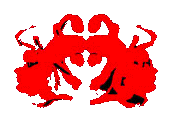|
|
|

|
 Indoctrination Indoctrination
& Inoculation
|

|
|
Ψ In religion & sociology, a cult is a cohesive group of people (often a relatively small & recently founded new religious movement) devoted to beliefs or practices that the surrounding culture or society considers to be far outside the mainstream. Its separate status may come about either due to its novel belief system, because of its idiosyncratic practices or because it opposes the interests of the mainstream culture. Other non-religious groups may also display cult-like characteristics.
Ψ In common usage, "cult" has a negative connotation, & is generally applied to a group by its opponents.
Ψ A cult is not a sect. A sect is a religious body that has separated from a larger denomination.
Ψ Cult Indoctrination - attitudes follow behavior.
• Compliance breeds acceptance. People usually internalize commitments made voluntarily, publicly, & repeatedly. Cult leaders know this and immediately move to strengthen the
new members commitment to the cult.
• Cult recruitment strategy exploits the foot in the door phenomenon.
Ψ Cult Indoctrination - Persuasive Elements.
• The Communicator:
Successful cults have charismatic Leaders. Charismatic leaders are thought to possess such qualities such as being visionary, energetic, & unconventional as well as having outstanding rhetorical ability. The Charismatic Leader gathers followers through dint of personality & charm, rather than any form of external power or authority.
• The Message: The vivid, emotional message, & the warmth & acceptance that the Cult showers on lonely & depressed people is awesomely effective.
• The Audience:
Recruits are often young people, under 25 (before attitudes & values stabilize). Most are educated, middle class people who are seeking answers that will make them happy.
Ψ Cult Indoctrination - Group Effects:
• Increasing behavior commitment
• persuasion
• group isolation
• "Love bombing"
• Cult influence techniques are similar to techniques used by socially approved groups like fraternities, sororities & self help groups. A thin line exists between education & indoctrination, enlightenment & propaganda, therapy & mind control, and between conversion & coercion.
• Persuasion is not intrinsically bad!.
Ψ Cult Inoculation - Resisting Persuasion:
• Stimulate Commitment - Before encountering others' arguments, make a
public commitment to your position.
• Warn the receiver of the impending attack.
• Attitude Inoculation: make a weak attack, so that when stronger attacks come,
a defense will already be established.
• Get the receiver to actively defend the attitude. Develop counter arguments.
Ψ Cult Inoculation - Implications:
• The way to build resistance to brainwashing isn't to strengthen one's
current beliefs.
• Educate people about cults
to prepare then to counter
persuasive appeals.
• Ineffective persuasion, by stimulating the
listeners' defenses, may be
counterproductive. An infective appeal can be worse than none.
• Be an active listener, & a critical thinker, force yourself to counter argue.
Don't just listen react!
•
Analyze! If a message cannot withstand careful analysis, it will fail to
convince
you. You will be
inoculated!
Social Psychology
Robert C. Gates
|

|
|









